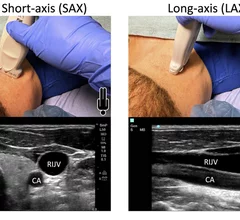Interventional Imaging
A subspecialty of interventional radiology (IR) uses image-guided, minimally-invasive procedures to diagnose and treat various diseases. Interventional radiologists rely on angiography, mobile C-arm and fluoroscopy imaging systems to perform thrombolysis, embolization, biopsies, vascular and other minimally invasive procedures, which can reduce recovery time, risk and costs. Find more IR content on the Society of Interventional Radiology (SIR) page.
Displaying 1 - 8 of 125












